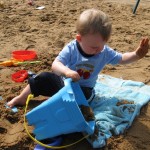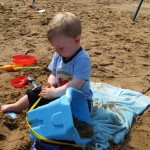ADHD OR HANDS-ON LEARNING? “FOCUSED” TODDLER” BECOMES “ATTENTION-DEFICIT” STUDENT?
- Learning to “scoop”
- Scooping is hard
- Try Again!
- Scoop, carry, dump! Impossible!
- Oh, well. Try dumping!
- Handle problem?
This 18-month old toddler is intent about learning. He is hard at work, figuring out every task, every piece of equipment put before him. He practices and practices until he masters a task. He comes back week after week to try again. He watches intently, trying to figure out “the trick” of doing each thing.
This child is an active, “hands-on” learner. He learns by doing.
Try blowing bubbles with him. While another child might clap their hands and chase the shiny bubbles, this one must “do it himself,” even if, time and again, he puts the blower into his mouth and ends up with a soapy taste. One day the wind helps him out, blowing bubbles out as he swings the wand. He is so ecstatic he almost falls out of the chair, and he repeats this magic time and again, laughing with joy: “I can do it!”
Months ago, he brought pop beads to me, over and over again, watching intently: how did they come apart? How go back together? Now, he has mastered the pulling apart, but not the putting back together. He stares and stares as I perform this magic: how do you do it?
Same with stacking blocks, placing rings on pegs, opening and closing small doors and windows, getting puzzle pieces to fit. He will practice over and over until he can do it, then move on.
The first day of kindergarten, he might be practicing standing on his head while the other children sit in a circle and listen to a story. First day of first grade, he is over trying to figure out how the pencil sharpener works while the others sit in a circle and listen while the teacher sings songs.
By fourth grade, when “academics” (reading and writing) thoroughly replace hands-on learning through manipulation, he will possibly be diagnosed as ADHD, “attention-deficit disorder,” and given medication so that he CAN sit still like all the other children while the teacher teaches.
Who is the real learner here? The passive recipient of information or the active, “hands-on” learner? Why does our education system place so much more emphasis upon “passive” learning, the absorption and reporting back of information? How can we justify that academic skills/college education will demarcate who will succeed and who will fail in our American society? There is no “equal opportunity” here!
Some children, some people, will never be “academically” inclined, in terms of enjoying reading literature and poetry, dealing with abstract similes and metaphors more than working with their hands. No amount of “equal opportunity” to a college education will allow them equal access to the rewards of our society, if their learning style is cut out of the curriculum starting in fourth grade, insuring their failure. Yet why can we say that their learning style, their skill set, is any less worthy of the extra funding that we give those who can make it into “college?”
We say these hands-on learners are unmotivated, not trying hard enough, “unfocused,” unable to concentrate, while we force them to learn in OUR style, sitting still for reading and writing, day after day.
And, when they fail, we shunt them into low-paying jobs or, most shamefully, fill our armed forces with them, their best option for hands-on skill training, only including that they risk their lives for their “higher education.”
This is not equal opportunity!! It will never be resolved by more chances to go to college. That door, the academic door, is firmly shut to them, as long as interest in reading and writing is the skill needed for getting in.
What if they were allowed hands-on learning opportunities throughout their school years, equally to reading and writing. What if by grade 12 they left school with skills in electrical wiring, welding, cable laying, construction, wood working, plumbing, website design, fashion design, horticulture, emergency medicine, and all the other hands-on things they could learn in twelve years! And what if these skills led to equal-opportunity higher education and high paying jobs?
The Career Academy model, which includes hands-on learning of specific job skills in high school learning communities, steps in this direction. Beginning in elementary school, Howard Gardner’s model of Multiple Intelligences shows how to incorporate all learning styles into education.
There is a huge inequality if reading-and-writing, academic preference for learning style, becomes the hurdle that learners have as the only path to equal opportunity education.
See Creative Edge Education, Creative Edge Parenting, and Dr. McGuire’s paper, “Don’t Fight Them, Join Them: Community-Wide Intervention for ADHD, School Drop Out, and Juvenile Delinquency.” You’ll find links to Gardner and other multi-modality models for education.
Find a variety of Personality Tests at our Creative Edge Focusing (TM) website, such as the Myers-Briggs Type Indicator (MBTI) and Keirsey Temperament Sorter, both of which give information about different kinds of learning style leading to differing career skills and preferences.
Free Downloads:
Complete Focusing Instructions Manual (17 pages)
“Ajas” Instantaneos Mini-Manual
Creative Edge Focusing (www.cefocusing.com ) teaches two basic self-help skills, Intuitive Focusing and Focused Listening, which can be applied at home and at work through The Creative Edge Focusing Pyramid.
Based upon Gendlin’s Experiential Focusing (www.focusing.org ) and Rogers’ Empathic Listening, our website is packed with Free Resources and instructions in these basic self-help skills. Learn how to build Support Groups, Conscious Relationships, and Creative Edge Organizations based upon these basic skills of emotional intelligence.
You can try out “Focusing: Find Out What Is Bothering You.”
Click here for a free Intuitive Focusing Mini-Course
Click here for a free Focused Listening Mini-Course
See Core Concept: Conflict Resolution to find a complete mini-course on Interpersonal Focusing and Conflict Resolution, including Rosenberg’s Non-Violent Communication, Blanchard’s “One Minute Apology,” Patricia Evan’s books on Verbally Abuse and Controlling Relationships, McMahon’s Beyond The Myth Of Dominance, and much more.
See Core Concept: Intimate Relationship to find a complete mini-course on increasing intimacy and sexuality, including the “Sharing Your Day” exercise, Listening/Focusing Partnerships for The Way of Relationship, untangling and equalizing desire, tantric sexuality, and much more.
Download complete Instant “Ahah!” Mini-Manual, in English and Spanish, from CEF Website, or download from links at top of this blog.
Find links to free articles, personality tests, multi-media Self-Help training, Classes and workshops
Dr. Kathy McGuire, Director





